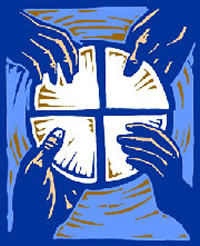
Body and Blood of Christ Year A
‘Do this in memory of me’. Many of the great things of life are kept alive through the ‘remembering’ of cherished traditions. Moses says to the people, ‘Remember … do not forget, the Lord fed you with manna’. In the words of John’s gospel before the passage we read today, Jesus has recalled this story of the Exodus, and likened himself to the manna given to the people in the midst of their complaining. Now he announces the inauguration of a new tradition - and, as John tells us, it too will be met with complaining. To this point, Jesus has been telling the people that he was foreshadowed in the manna. He came to nourish their old faith. Now, however, he makes a dramatic announcement. In all that he does, he is giving expression to the ways of his Father - taking up the initiative himself. He will become the nourishment of God’s people in a way that could never have been anticipated: ‘The bread that I shall give is my flesh for the life of the world’.
John uses the word ‘flesh (sarx)’ in this reference to the Eucharist. We are accustomed to using another term, speaking of the ‘body (soma)’ of Christ. In the early Church, both terms were in use. When we recall the Prologue of John’s gospel - ‘The Word became flesh’ - we can recognise the implications of this term. ‘All flesh is grass’, Isaiah declares, ‘The grass withers; but the word of God remains forever’ (Is 40:6-8). When the Prologue of John’s gospel echoes these words - ‘The Word was made flesh’ - it is underlining the full implications of the Incarnation: the Son of God ‘emptied himself’, as Paul says, coming to share our humanity in all its frailty. John is presenting the Eucharist as the sacrament of this Incarnation and all that it was to give to the world. He is also affirming the ‘healthy materialism’ of the biblical tradition. For all its frailty, the human body is God’s creation; and in the Incarnate Christ it has become our salvation and the source of eternal life for us.
‘This is my body, given, broken, for you. This is my blood poured out for the whole world’. All this is clearly, but subtly, implied in the words of John’s gospel. ‘Sent by the Father’, Jesus is still carrying out - in the eucharistic mystery - the great task he had been given. In John’s account of the last days of the Saviour, Jesus declares, ‘And when I am lifted up from the earth I shall draw all people to myself’ (Jn 12:32). In the Mass, we are given to share in the Saviour’s return to the Father, making intercession for the whole human family. ‘As I draw life from the Father, so whoever eats me will draw life from me’ – our sharing in ‘this one loaf’ is nothing less than a sharing the life of the Father. It is unfortunate that discussion of this passage often does not get beyond a defence of the ‘real presence’. The Eucharist is the sacrament of the whole drama of salvation - ‘Anyone who eats my flesh and drinks my blood has eternal life, and I shall raise him up on the last day’. ‘Communion’, the term we have long associated with this sacrament, has implications that have been neglected. Our ‘communion’ in the Saviour’s return to the Father – his Paschal Mystery - is what unites us as members of his Church.
This gospel, in its emphatic rejection of the murmuring of those who do not accept the teaching of Jesus, certainly upholds the challenging truth of the Eucharist in what has been the Church’s faith since the beginning. The repeated reference to ‘eating and drinking’ clearly echoes the eucharistic practice of the apostolic Church.
John Thornhill sm

